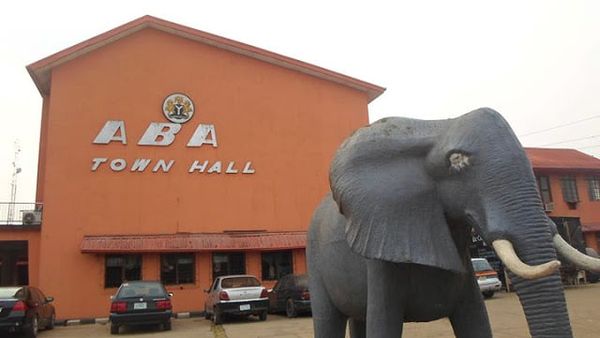Business and management consultant Mac Atasie has a single message for the Aba business community: focus on export, building on your low labour cost relative to the competition. Sir Atasie was one of two guest speakers at the behest of the Abia State Mass Mobilisation Agency on Saturday 19 June 2021 at Emanate Hotel Aba to sensitise and motivate the business community about the opportunities out there. A participant excitedly shared his impressions on the Abia Reporters platform, but it was so full of wind, I asked, what did Mac Atasie say?


I reached out to Sir Atasie, who then shared his presentation. Atasie stated, “My message is that a key reason we struggle with our businesses is that the entire business environment in Nigeria is full of poverty and excessive reliance on importation, whereas exports will help provide the funds to power necessary imports.
“My message focused on the opportunities and ways to break in a big way into the export market. First, we need to recognise that our businesses will struggle if we do not play big in the export market. Second, playing big requires the use of modern tools and large scale to help reduce cost but more importantly to recognise that we are poor enough to compete because the cost of labour is a key challenge for most developed countries. Still, we are poor enough to use that to our advantage.”
Atasie added, “The consumer will patronise us if our cost is better than others and our quality is good. Selling to Nigerians is good, but our poverty means our prices and margins will remain low, and we will keep failing to generate dollars required to buy those items which we cannot produce here. No nation can produce everything.
“China, with their one billion population, only became successful by exports. Export orientation is a proven model, and we must make it work for us. We need clear and bankable business plans to focus our state and its indigenes to imbibe the necessary factors to play big in export in specific areas where the world must know us as best. We need our people to dream big, attract available funds, and play in the big export space. Titi and I showed some areas we can pursue at scale and drive growth in investment capital.”
What I call the Mac Atasie Single-Force Competitive Framework unfurled against the backdrop of the release of the States Ease of Doing Business Survey Results 2021. The Presidential Enabling Business Environment Council (PEBEC) report showed mixed fortunes for the five South-East states. Chronological first, Abia State, was the last, landing at 33rd position. Anambra was fourth, Imo, 11th, Ebonyi ended at 23 and Enugu at 27. Only Anambra State featured in the first 10. Gombe State (yes) was number one in the results KPMG prepared for PEBEC.
Sir Atasie affirmed that Abia State should not focus on the current standing but see it as a starting point to kickstart focused growth. Export should be the area of primary attention. Of course, there are many more areas all supportive of the export focus.
Atasie again: “I mentioned old palm trees, shoe sector, garments, ICT, trade, light-scale manufacturing. We need to prepare our minds to do the needful. We can attract and channel available World Bank money if we do the needful: attract angel investors; I did many in Lagos in my 30s to build many companies. We must do the same here to use our very entrepreneurial populace to attract investments and make our place a Mecca for money-making. It is with seven states surrounding us and 40m residents, gas pipelines and loads of warehouses. We are ready for investments, and this makes it a good time. Aba is open for business, and we need to pursue exports to drive local growth”.
Aba is open for business but needs exports to drive local growth. Aba also needs speedy improvements in the enabling business environment. The Abia State Government needs to do better and quicker.
PEBEC considers four principal enablers in the States Ease of Doing Business Survey. They are Infrastructure and Security, Transparency and Accessibility to Information, Regulatory Environment, and Skill and Labour. The factors under each are instructive.
Infrastructure and security components are electricity, transportation, primary healthcare, and security. Under Transparency and accessibility to information are investment promotion and state information structure. Regulatory Environment components include paying taxes, starting a business, enforcing contracts, land, property acquisition and development. Technical and professional skills are the only component of Skill and labour.
Funding features prominently in the Atasie thesis with a focus on the World Bank. As I read it, I reflected ruefully on the Central Bank of Nigeria statement accusing South-East entrepreneurs of wilful reluctance to access the various funding windows the CBN created. Central Bank of Nigeria has failed to provide details and substantiation even against the push back by Prof Greg Ibeh, Chancellor of Gregory University, Uturu, who accused the CBN of lying and bad faith.
Atasie’s paper builds on Michael Porters Five Forces Framework for industry competition and the expanded six forces for national competitiveness. The six factors of competitive advantage are quality, price, location, selection, service, and speed/turnaround. Atasie isolates quality and price from the factors, labour cost being a component of cost.

Changing mindsets and value proposition are the keys to delivering Aba for export. Dubai, a desert in 1991 and one of the foremost global destinations for business and tourism in 2016, is an example. Aba for export means Aba for quality, and it is feasible.




GIPHY App Key not set. Please check settings